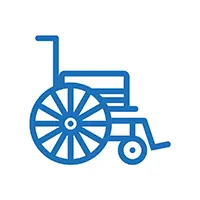There are people whose jobs are to support disabled people to live their best life. Check it out.
- Kaitūhono/Connector
- Occupational therapist
- Physiotherapist
- Speech language therapist
- Hearing therapist
Kaitūhono/Connector
A Kaitūhono/Connector is an ally that works alongside disabled people and whānau to build an aspirational Good Life plan, connect with community, and prepare for the future.
Some of the things a Kaitūhono/Connector does include:
- Taking the time to build a trusting relationship with you.
- Helping you explore options to build connections within the community.
- Assisting you to have a vision that focuses on what’s important to you.
- Helping you explore a range of life opportunities.
- Helping you make choices and decisions.
- Helping you apply for funding.
- Looking ahead and supporting you to plan for changes, like starting school, or moving into a flat.
- Recognising your strengths and supporting you to think about what you can contribute to your community.
- Encouraging you to look at community-based options to support you to do the things you want to do.
- Assisting you to access the supports available from government agencies.
How to get support from a Kaitūhono/Connector
You can currently get support from a Kaitūhono/Connector in three regions in New Zealand, these are:
- Waikato
- MidCentral (Horowhenua, Manawatū, Tararua, Otaki)
- Christchurch
To get support from a Kaitūhono/Connector get in touch with your local provider, they will be able to advise you on the next steps.
Waikato
Enabling Good Lives Waikato
Phone: 07 957 1561
Email: enabling_good_lives_waikato@msd.govt.nz
MidCentral
Mana Whaikaha
Phone: 0800 626 255 (open 8 a.m. to 5 p.m., Monday to Friday)
Email: admin@manawhaikaha.co.nz
Christchurch
Enabling Good Lives Christchurch
Phone: 0800 225 570
Email: info@eglives.co.nz
Occupational therapists
Occupational therapists (also known as OTs) provide therapy and support to people who need help to carry out everyday activities because of illness, injury, or disability.
Their ultimate goal is to enable people to participate in the activities of everyday life.
An occupational therapist can help you, or the person you care for, by:
- Assessing a client’s abilities and helping them gain or regain skills
- Planning and directing therapy treatment, including physical and social activities
- Assessing the safety of your home or workplace
- Providing advice on equipment or recommending changes to home or work environments
- Providing advice on lifestyle changes that can be made to help with daily activities.
According to Health Navigator, there are several conditions where it can be good to get help from an Occupational Therapist. These include:
- arthritis and joint problems
- chronic pain
- stroke
- brain injury
- dementia
- cancer
- diabetes
- nerve problems
- multiple sclerosis
- cerebral palsy
- spinal cord injury
- mental health and behavioural problems.
How to get support from an occupational therapist
Talk to your doctor who can refer you, or the person you care for, to see an OT through the public health system. You can also pay to see an OT privately.
The Healthpoint website has a database of OTs across the country.
Find an OT near you on Healthpoint (external link)
Physiotherapists
Physiotherapists (also known as PTs) help people regain or improvement their movement and function after they have been affected by an injury, disability, or health condition. They can also give advice on how to prevent injuries.
A physiotherapist can help you, or the person you care for, by:
- assessing injuries or functional problems and deciding on a treatment plan
- using a range of treatments and exercises to reduce pain and improve movement and strength
- providing information and advice on general lifestyle, body movement and postures to prevent injuries
- educating caregivers and family about the patient's physiotherapy programme.
According to Health Navigator, there are several conditions where it can be good to get help from an Occupational Therapist. These include:
- arthritis
- strains and sprains
- sports injuries
- incontinence
- back pain, neck pain, shoulder pain
- fractures or broken bones
- rehabilitation after a heart attack
- recovery after surgery
- lungs and breathing problems such as COPD or cystic fibrosis
- neurological conditions such as Parkinson's disease, stroke or multiple sclerosis
- developmental delays in children.
How to get support from a physiotherapist
You do not need a doctor’s referral to see a physiotherapist.
The Healthpoint website has a database of physiotherapists across the country.
Find a physiotherapist near you on Healthpoint (external link)
Speech language therapist
Speech language therapists help people who struggle to communicate verbally or to swallow.
A speech language therapist can help you, or the person you care for, by:
- Assessing and diagnosing communication and swallowing problems.
- Planning and providing treatments.
- Providing advice, information, and support to people with communication and swallowing difficulties, their carers, and their whānau.
According to Health Navigator, there are several conditions where it can be good to get help from a Speech Language Therapist. These include:
- stroke
- cancer such as brain cancer, head and neck cancer or lung cancer
- injury to your head, neck or spine
- palliative care conditions
- neurological conditions such as Parkinson's disease, Huntington's disease, motor neurone disease, multiple sclerosis, dementia and muscular dystrophy
- intellectual disability
- congenital conditions.
How to get support from a speech language therapist
Talk to your doctor who can refer you, or the person you care for, to see a speech language therapist through the public health system. You can also pay to see one privately.
The Healthpoint website has a database of speech language therapists across the country.
Find a speech language therapist near you on Healthpoint (external link)
Hearing therapist
Hearing therapists help people adjust to living with hearing loss. They assist people to manage their hearing loss in their everyday lives. According to the Hearing Therapists Association of New Zealand, they may do this by:
- Exploring different ways to manage communication
- Providing information about audiological and other relevant local services
- Providing information on funding options for hearing aids, amplified and alerting equipment
- Teaching you how to use your hearing aids effectively
- Providing information about tinnitus and ways to manage it, including referral to other health professionals if necessary.
How to get support from a hearing therapist
You can refer yourself to a hearing therapist, or be referred by a doctor, audiologist, or ear, nose, and throat specialist.
The Hearing Therapists Association of New Zealand has a information about finding a hearing therapist near you.
Find a hearing therapist (external link)
Last updated on Monday, 15 August 2022














